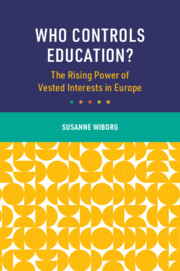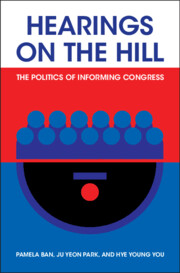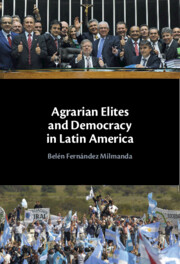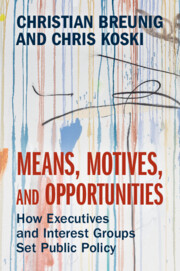133 results
16 - Health Law’s Sheathed Sword
- from Part IV - How Private law Can and Cannot Control Costs
-
-
- Book:
- Health Law as Private Law
- Published online:
- 16 March 2025
- Print publication:
- 27 March 2025, pp 204-216
-
- Chapter
-
- You have access
- Open access
- HTML
- Export citation

Who Controls Education?
- The Rising Power of Vested Interests in Europe
-
- Published online:
- 26 March 2025
- Print publication:
- 03 April 2025
Beyond Group Membership: New Way of Measuring Environmental Interest Group Strength in the American States
-
- Journal:
- State Politics & Policy Quarterly ,
- Published online by Cambridge University Press:
- 14 February 2025, pp. 1-23
-
- Article
- Export citation
Who Does and Who Does Not Engage in Strategic Litigation in European Law?
-
- Journal:
- German Law Journal / Volume 25 / Issue 6 / August 2024
- Published online by Cambridge University Press:
- 24 January 2025, pp. 856-872
-
- Article
-
- You have access
- Open access
- HTML
- Export citation
Neoliberal reforms, Great Recession and political backlash: parties, groups and voters in the new politics of welfare in Italy
-
- Journal:
- Italian Political Science Review / Rivista Italiana di Scienza Politica , First View
- Published online by Cambridge University Press:
- 21 January 2025, pp. 1-15
-
- Article
-
- You have access
- Open access
- HTML
- Export citation

Hearings on the Hill
- The Politics of Informing Congress
-
- Published online:
- 21 November 2024
- Print publication:
- 28 November 2024
6 - Conclusions, Extensions, and Implications
-
- Book:
- Agrarian Elites and Democracy in Latin America
- Published online:
- 15 November 2024
- Print publication:
- 21 November 2024, pp 196-216
-
- Chapter
- Export citation

Agrarian Elites and Democracy in Latin America
-
- Published online:
- 15 November 2024
- Print publication:
- 21 November 2024
Linking datasets on organizations using half a billion open-collaborated records
-
- Journal:
- Political Science Research and Methods , First View
- Published online by Cambridge University Press:
- 16 October 2024, pp. 1-20
-
- Article
-
- You have access
- Open access
- HTML
- Export citation
The Most Iniquitous Lobby: The Committee for Constitutional Government and the Shaping of American Politics, 1937–1955
-
- Journal:
- Journal of Policy History / Volume 36 / Issue 3 / July 2024
- Published online by Cambridge University Press:
- 27 August 2024, pp. 281-307
-
- Article
-
- You have access
- Open access
- HTML
- Export citation
Revolving doors in Europe: does hiring from the public sector facilitate access?
-
- Journal:
- Journal of Public Policy / Volume 44 / Issue 4 / December 2024
- Published online by Cambridge University Press:
- 04 June 2024, pp. 679-696
-
- Article
-
- You have access
- Open access
- HTML
- Export citation
CHORUS: A New Dataset of State Interest Group Policy Positions in the United States
-
- Journal:
- State Politics & Policy Quarterly / Volume 24 / Issue 3 / September 2024
- Published online by Cambridge University Press:
- 17 May 2024, pp. 322-347
- Print publication:
- September 2024
-
- Article
-
- You have access
- Open access
- HTML
- Export citation

Means, Motives, and Opportunities
- How Executives and Interest Groups Set Public Policy
-
- Published online:
- 11 April 2024
- Print publication:
- 08 February 2024
Information, politicization, and reputation: assessing interest groups’ agenda-setting influence in the EU
-
- Journal:
- European Political Science Review / Volume 16 / Issue 4 / November 2024
- Published online by Cambridge University Press:
- 14 February 2024, pp. 578-595
-
- Article
-
- You have access
- Open access
- HTML
- Export citation
1 - Explaining One Million Policy Stories
-
- Book:
- Means, Motives, and Opportunities
- Published online:
- 11 April 2024
- Print publication:
- 08 February 2024, pp 3-24
-
- Chapter
- Export citation
4 - Opportunities
-
- Book:
- Means, Motives, and Opportunities
- Published online:
- 11 April 2024
- Print publication:
- 08 February 2024, pp 110-141
-
- Chapter
- Export citation
2 - Meeting at the Margins
-
- Book:
- Means, Motives, and Opportunities
- Published online:
- 11 April 2024
- Print publication:
- 08 February 2024, pp 25-66
-
- Chapter
- Export citation
8 - Dogonomics
-
- Book:
- Dog Economics
- Published online:
- 11 January 2024
- Print publication:
- 01 February 2024, pp 175-188
-
- Chapter
- Export citation
The population ecology of interest groups and counter-mobilization: reproductive rights organizations in the United States, 1920–1985
-
- Journal:
- Political Science Research and Methods / Volume 13 / Issue 2 / April 2025
- Published online by Cambridge University Press:
- 19 January 2024, pp. 455-464
-
- Article
-
- You have access
- Open access
- HTML
- Export citation
Empires, Languages, and Scripts in the Perso-Indian World
-
- Journal:
- Comparative Studies in Society and History / Volume 66 / Issue 2 / April 2024
- Published online by Cambridge University Press:
- 11 January 2024, pp. 443-469
-
- Article
-
- You have access
- Open access
- HTML
- Export citation


